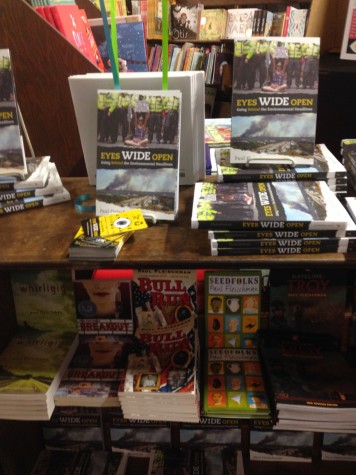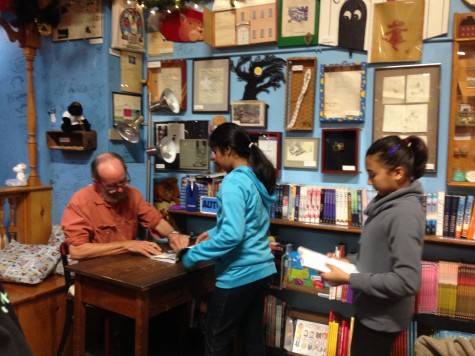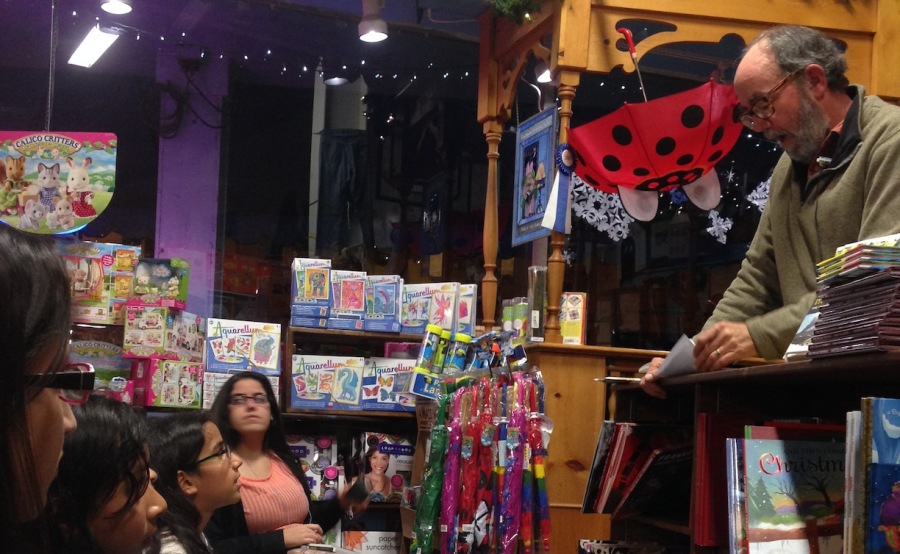“An Environmental Crisis in Plain Sight”
December 19, 2014
“The problem is not with the supply anymore, it’s with the side effects,” said Paul Fleischman at his book’s, Eyes Wide Open, press conference. The Hicklebee’s bookstore in Willow Glen’s downtown was full of curious and excited kids, adults, and authors to hear author Paul Fleischman speak about his book on the environment called Eyes Wide Open on Tuesday Dec. 2.
Eyes Wide Open, a book designed to be adaptable for the youth, is about how the abundant use of fossil fuels and human ignorance has led to a deteriorating environment. Moreover, the book goes on to talk about how money, politics, and science play a role. Fleischman also offers solutions to this important issue. It is now released and on sale.
The event began with a Mitty high schooler sharing a few facts about Fleischman. She told the audience that Fleischman was born in Monterey but raised in Santa Monica, along with his past jobs and education. She also mentioned her first meeting with Fleischman; she was in second grade and had to do a book report on “Whooping Boy.”
Then, Fleischman started talking about his book. He began by answering his own question: Why write a book like this? While reading “Collapse” by Jared Diamond, a UCLA professor, Fleischman started noticing the dead bees on his car — slowly and slowly increasing more and more. At that time, he resided in Aromas CA, so he started seeing that animals were disappearing and dead snakes were visible. He said, “A big thing was happening as if it was a ‘silent holocaust,’ something that was not in the newspapers but hiding in plain sight.”
Another reason Fleischman decided to write about the environment was because “when I was in high school, kids were going to war in Vietnam, yet school newspapers wrote about pep rallies, spirit weeks, etc. Just like that, I needed to write about the ignored environment — bridge the gap.”
Fleischman said he wrote this story to be especially teen adaptable because “teens will be in the middle of this problem sooner which is very crucial for them to understand; moreover, they have

open minds.”
Fleischman compares his book to a toolbox where each chapter is a new tool. On the margins, Fleischman has inserted photographs, facts, and references that all relate to real life.
“They are very important and took a lot of time to take out the right things for margins; came out of man and his symbols,” said Fleischman.
Fleischman talked about the usage of fossil fuels as the biggest problem in our environment currently. It is on a ticking clock, so we need to switch away from it now. People ask: why did we even begin with fossil fuels if they were such a big issue? Fleischman’s response was “we found fossil fuels and were curious and wanted play with it. At first, people despised oil, finding it to be gross and sticky, however now people just can’t let it go.”
After this, questions were asked by journalists or other students in the crowd. Questions concerning politics, human behavior, power, and solutions.
Fleischman started the conversation on politics by saying that political flyers “sound great but they can be the opposite of what they mean.” He added, “well, adults lie.” We need to be the change that we wish to see being enforced. We must let the “big guys” know what we want so that they can initiate some solution to this important crisis. Politically, the greatest way the environment will be recognized is through votes, however the youth is not voting even though they will make the biggest impact. In the past midterms, only 36 percent of registered voters voted.
“Leaders don’t actually lead, they actually follow, so when people change their attitude, the politicians are forced to change their own attitude because all they really want is to be re-elected,” said Fleischman referring to politicians’ responding to the peoples’ concerns.
Next, Fleischman differentiated between the right and wrong resources for information. He said, “When you have a broken car, do you fix it? No. You go to a mechanic. So, using the same strategy, find a source you trust and fact check your information.” He also talked about newspapers being reliable sources because they cover all sides of an issue; however, blogs are more opinion oriented, therefore are not recommended. Fleischman also said, “the internet is an easy tool to fool people, but its also just as easy to look up any information you are looking for, so take advantage of that.”
It took Fleischman four years, off and on, to write this book. He said, “[it took a while] because there were a lot of different issues regarding the environment that kept on changing.”
Afterwards, Fleischman went into depth discussing about why people’s denial is so prominent towards the environment.
“Lots of people see no problem,” said Fleischman. He said the best way to rid this issue is by continuously nagging people until they get to the point of being annoyed. Fleischman gave the example of rising gas prices.
“When gas prices reach four dollars, people are compelled to carpool. Just like that we need to compel people to understand and care for the crisis.” Fleischman said, “Though, I don’t have a real answer to this, I wish I had answer to this. Maybe you will have the answer to this.”

Fleischman talks about all what people have now as a “luxury,” that people call a necessity. Dishwashers, sprinklers, ovens, laundry machines, cars, and so on are all unneeded things. We could stop watering our plants, ride bikes, hang clothes in our backyards to dry, and so on. But, not many people would be comfortable with that. This change is the change people fear.
Fleischman has a website for the book that can be found here. The book has been out for only 8 weeks so the website has very few submissions but is now open. The website has different explorable resources for everyone. Fleischman’s blog, outside submissions, and news headlines can be found on this website.
“The environment is not a dying issue, things keep on happening.” said Fleischman. Everyone needs to make a change now so that we can have the opportunity to see tomorrow.
Our environment is calling for our attention. Fleischman said, “it doesn’t seem like a big problem until the water goes bad or you lose your clean air.”
Fleischman decreased his consumption of meat, moved from Aromas to Santa Cruz and traveled by bus. If everybody did their part, we would see a tremendous change.
“I think that the environment is the key to unlock other problems such as hunger issues and poverty; to solve those, we must find the key to our environment first,” said Fleischman.
In early 2013, California governor, Jerry Brown, declared that CA was in a major drought; 2013 being the driest year ever. Though, the winter of 2014 brought a major storm that left different areas of California with 2 – 6 inches of rain.
However, that is not enough. California is still under “normal” water level. Continuous rain must hit California until springtime in order to be close to the normal water level. Alongside, people must conserve water despite the rain. The most important step people must take is to inform themselves about the environment.

Julia • Dec 19, 2014 at 8:48 am
I love how Fleischman empowers people of all ages to educate themselves about the environment.
Great piece!